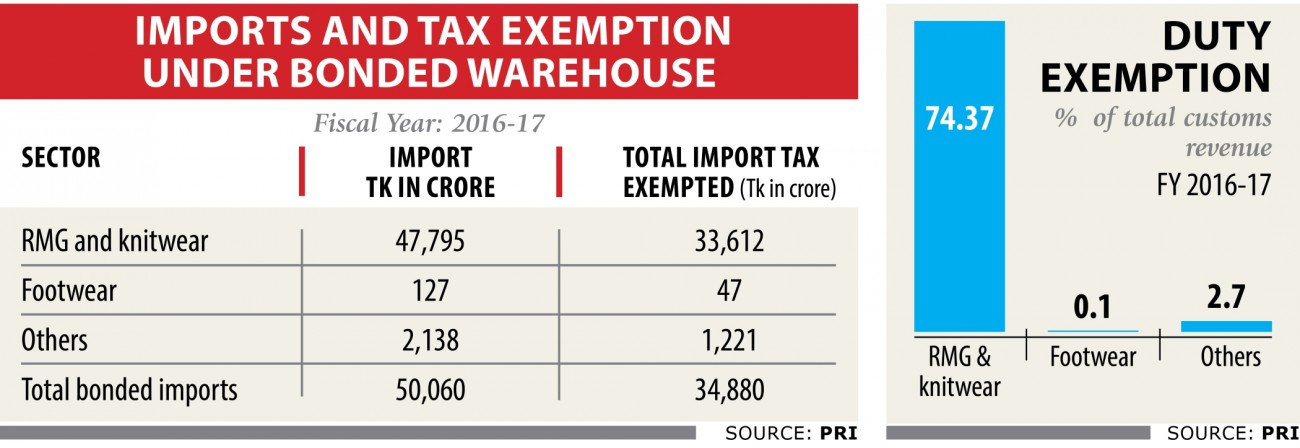Export diversification hinges on access to bonded warehouse

Easing access of non-RMG sectors to bonded warehouse benefit, an opportunity to ensure duty-free import of raw materials of export items, is vital to diversify the country’s export basket, said analysts yesterday.
The National Board of Revenue (NBR) provides duty-free import benefit to exporters under the bonded warehouse scheme and benefit is mostly enjoyed by apparel exporters.
Around 84 per cent of Bangladesh’s export basket of $40.5 billion in fiscal year 2018-19 was filled up by ready-made garments while the rest 16 per cent failed to reap the bonded warehouse privilege fully.
Lack of readiness of the revenue authority to provide similar treatment to all export sectors, partly because of its inadequate resources to monitor all the bond licence-holders, is blamed for non-RMG sectors’ failure to reap full advantage of bond facility.
“Export diversification is linked to existence of bonded warehouse facility as it provides scope to buy raw materials at international prices. This facility needs to be extended to other sectors,” said Zaidi Sattar, chairman of the Policy Research Institute of Bangladesh.
He spoke at a session of the two-day SANEM Annual Economists’ Conference 2020.
South Asian Network for Economic Modeling (SANEM) organised the event for the fifth time at the Spectra Convention Centre in Dhaka, Bangladesh.
Sattar said Bangladesh exported 1,605 items in 2018 and nearly 250 of those were RMG items.
Of them, 299 products registered over $1 million in export receipts and the rest—none of which use bonded warehouse facility—recorded below $1 million, he said.
Sattar said high tariff to protect domestic industries has also created an anti-export bias among non-RMG exporters.
“We have a system of perpetual protection when choice comes for producing for domestic market. Non-garment gets high incentive to produce for the domestic market,” he said.
Sattar said non-garments must have access to bonded warehouse benefits for export diversification.
Non-RMG exports ranged between $5 billion to $7 billion a year during fiscal year 2013-17, said Nusrat Nahid Babi, private sector specialist of World Bank Group.
Effective bonded warehouse benefits could have boosted non-RMG exports by approximately $1.5 billion a year, she said.
She said Bangladesh’s source of cost competitiveness is low-cost labour but raw materials and intermediate goods are subject to tariffs.
“To be competitive, Bangladeshi exporters need to be guaranteed imported inputs at world prices.
That is, imports must be available at duty-free prices, upfront,” she said, adding that bonded warehouse benefits ensure duty-free imports, creating a level playing field on the global market.
“Then labour cost advantage can be exploited fully. As long as tariffs exist and remain high, bonded warehouse benefit is a must for export success,” said Babi.
She said though existing statutory regulatory order extends bonded warehouse facility to non-RMG, grant of licence is selective because they are not 100 per cent export-oriented.
Mindset is an issue, she said. Manual administrative and supervision process is another challenge, she added.
Answer lies in modernisation and full automation of bonded warehouse management, she said.
Bonded warehouse benefits helped apparel sector grow, said Asif Ibrahim, vice chairman of Newage Group.
Policy should be consistent to every sector, not biased to one sector, he said, also suggesting rationalisation of tariff structure.
There is no discrimination in policy regarding bonded warehouse privilege between RMG and non-RMG sectors, said Abu Nur Rashed Ahmed, additional commissioner of the Customs Bond Commissionerate, Dhaka.
“We provide equal access as per rule. It is not that we have not given licences to any sector. They have to apply,” he said.
A list of products having competitive advantage should be prepared and bonded warehouse benefits can be provided to those sectors, said Abul Kasem Khan, managing director of AK Khan Telecom Ltd.
Citing small and medium exporters, he suggested establishment of common bonded warehouses to increase shipment.
Leakage of bonded warehouse is a matter of concern for the revenue authority and the finance ministry officials, said Masrur Reaz, senior economist and programme manager of the World Bank Group in Dhaka.
“This can be reduced to a large extent through tech upgrade in bonded warehouse system.”
A change in mindset be the beginning of a new journey, he said.
